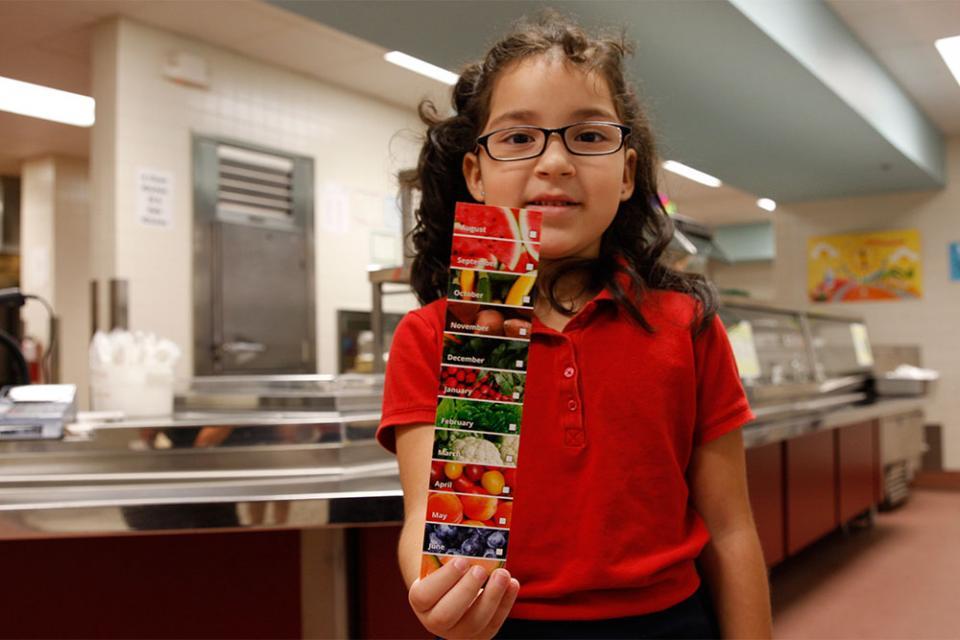


Nutrition Information
We offer high-quality, nutritious meals following the strict guidelines set by the United States and Texas Departments of Agriculture.

Proper nutrition is essential to a great education. It helps students stay focused and retain information. This is why we offer high-quality, nutritious meals following the strict guidelines set by the United States and Texas Departments of Agriculture.
For more information about the benefits of school lunch, please visit the Food Research & Action Center (FRAC) website.
We offer a variety of choices and provide allergen and nutritional information for each menu item. Students may select options that meet their individual needs.
Allergen and nutritional information is available through the SchoolCafe website for each food item or recipe.
If you have food allergies that could result in severe, life-threatening reactions, see our page about special dietary needs.
Fighting Childhood Obesity
Childhood obesity is a growing problem. Over the past 30 years, the number of obese children has more than doubled and the number of obese adolescents has quadrupled.
Childhood obesity has both immediate and long-term effects on health and well-being:
- Obese children are more likely to have high cholesterol or high blood pressure which could lead to heart disease.
- Obese adolescents are at a high risk of developing diabetes.
- Children and adolescents who are obese are at greater risk for bone and joint problems, sleep apnea, and social and psychological problems such as stigmatization and poor self-esteem.
- Overweight and obesity are associated with increased risk for many types of cancer.
What are we doing in schools?
We want to help students learn and implement healthy food choices. We do this by:
- Offering and promoting a wide variety of fruits and vegetables daily
- Offering menu items that are whole-grain rich
- Limiting the fat and saturated fat in foods
- Eliminating trans-fats
- Eliminating deep-frying as a preparation method
- Finding ways to incorporate more whole grains into our menus
- Reducing sodium in all foods offered
What can parents do?
Children consume 2/3 of their meals outside of school. Parents play a crucial role in teaching their children healthy choices. You can teach your children about the importance of a healthy diet and daily physical activity starting at an early age. Remember, the best way to teach is by example. Cooking together and taking family bicycle rides or walks will not only help you reach your health and fitness goals but give you an opportunity to spend quality time with your family.
Body Mass Index (BMI)
BMI measures weight in comparison to height to determine the amount of body fat. Parents can use a BMI calculator to determine if their child is at a healthy weight. However, it does not take individual circumstances in mind and it is not intended to be a substitute for professional medical advice. Parents can seek advice from their health-care provider on healthy weight status.
For more information about obesity, visit the Centers for Disease Control and Prevention (CDC) webpage.
A way of life
Make eating healthy and proper fitness a way of life.
Key things to remember for staying healthy:
- Eat a healthy diet with plenty of fruits, vegetables, and whole grains.
- Watch your portion sizes.
- Get some kind of physical activity every day.
Small changes can make a big difference:
- Drink water instead of sweetened beverages such as soda and juice cocktails.
- Eat whole-grain pasta, rice and crackers instead of refined grains.
- Satisfy cravings for sweets with fruit and a small side of peanut butter.
- Season foods with seasoning and spices instead of salt.
- Have fresh or frozen fruits and vegetables instead of canned whenever possible.
Some fun ways for children to get active:
- Sign up for recreational sports.
- Go rollerblading with your dog.
- Dance to your favorite song.
- Enjoy pool time with friends.
- Enjoy interactive video games that make them sweat.
Contact us
This institution is an equal opportunity provider.















